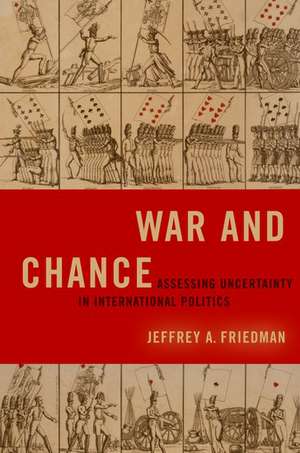War and Chance: Assessing Uncertainty in International Politics: Bridging the Gap
Autor Jeffrey A. Friedmanen Limba Engleză Paperback – 20 oct 2021
| Toate formatele și edițiile | Preț | Express |
|---|---|---|
| Paperback (1) | 124.94 lei 31-37 zile | |
| Oxford University Press – 20 oct 2021 | 124.94 lei 31-37 zile | |
| Hardback (1) | 247.79 lei 10-16 zile | |
| Oxford University Press – 30 mai 2019 | 247.79 lei 10-16 zile |
Preț: 124.94 lei
Preț vechi: 135.63 lei
-8% Nou
Puncte Express: 187
Preț estimativ în valută:
23.91€ • 24.87$ • 19.74£
23.91€ • 24.87$ • 19.74£
Carte tipărită la comandă
Livrare economică 03-09 aprilie
Preluare comenzi: 021 569.72.76
Specificații
ISBN-13: 9780197619131
ISBN-10: 0197619134
Pagini: 242
Ilustrații: 46 black and white line drawings
Dimensiuni: 155 x 231 x 15 mm
Greutate: 0.36 kg
Editura: Oxford University Press
Colecția OUP USA
Seria Bridging the Gap
Locul publicării:New York, United States
ISBN-10: 0197619134
Pagini: 242
Ilustrații: 46 black and white line drawings
Dimensiuni: 155 x 231 x 15 mm
Greutate: 0.36 kg
Editura: Oxford University Press
Colecția OUP USA
Seria Bridging the Gap
Locul publicării:New York, United States
Recenzii
Friedman makes an extraordinarily fine contribution to international relations theory and, more importantly, to rational choice theory. He analyzes with meticulous precision and a wealth of literature support an essential characterization in foreign policy decision-making: the element of uncertainty or the lack of perfect information in the context of any situation. Friedman's scholarship is an essential read to appreciate the efforts necessary for intelligence analysis and the assessment and evaluation of gathered information that becomes the basis for operational decisions ... This book will become a classic reference for those involved in intelligence decisions.
In short, War and Chance is an articulate, closely reasoned, empirically tested challenge to fundamental assumptions, which continue to shape analytic practice in the intelligence community, about how (and how not) to think rigorously and transparently about uncertainty.
Jeff Friedman's War and Chance makes an important contribution to the literature on intelligence analysis, intelligence reform and the assessment and evaluation of evidence in intelligence estimates. It is comprehensive, well-written, well-organized, and meticulous in its analysis. It carefully, logically and strongly advocates for the use of more precise numerical probability estimates in making judgments and predictions regarding uncertain events over the use of vague wording such as 'highly likely' or 'unlikely.' Friedman's book does a terrific job marshaling an enormous amount of material to make a creative argument which deserves much wider discussion.
The world is uncertain, but even the most experienced leaders and policy experts have great difficulties dealing with probabilities. Jeffery Friedman's deep discussion of how this kind of analysis can lead not only to a better understanding but also to better practices.
Uncertainty is a large, inevitable, but unwelcome part of national security decision-making, and is too often obscured rather than recognized and confronted. In an elegant and creative analysis, Jeffrey Friedman persuasively refutes many longstanding misconceptions and provides analysts and practitioners alike an invaluable guide to thinking about the unknown.
In short, War and Chance is an articulate, closely reasoned, empirically tested challenge to fundamental assumptions, which continue to shape analytic practice in the intelligence community, about how (and how not) to think rigorously and transparently about uncertainty.
Jeff Friedman's War and Chance makes an important contribution to the literature on intelligence analysis, intelligence reform and the assessment and evaluation of evidence in intelligence estimates. It is comprehensive, well-written, well-organized, and meticulous in its analysis. It carefully, logically and strongly advocates for the use of more precise numerical probability estimates in making judgments and predictions regarding uncertain events over the use of vague wording such as 'highly likely' or 'unlikely.' Friedman's book does a terrific job marshaling an enormous amount of material to make a creative argument which deserves much wider discussion.
The world is uncertain, but even the most experienced leaders and policy experts have great difficulties dealing with probabilities. Jeffery Friedman's deep discussion of how this kind of analysis can lead not only to a better understanding but also to better practices.
Uncertainty is a large, inevitable, but unwelcome part of national security decision-making, and is too often obscured rather than recognized and confronted. In an elegant and creative analysis, Jeffrey Friedman persuasively refutes many longstanding misconceptions and provides analysts and practitioners alike an invaluable guide to thinking about the unknown.
Notă biografică
Jeffrey A. Friedman is Assistant Professor of Government at Dartmouth College. His research focuses on the ways in which risk and uncertainty shape high-stakes policy decisions, particularly in the domain of national security. His research has been published by the American Journal of Political Science, International Organization, and International Security, among other journals. He received his Ph.D. from Harvard University in 2013.











